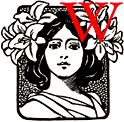 illiam Morris had a major influence on J. R. R. Tolkien.
As John Garth points out, unlike most authors traumatized by the experience of World War I, Tolkien did not "discard the old ways of writing, the classicism or medievalism championed by Lord Tennyson and William Morris. In his hands these traditions were reinvigorated so that they remain powerfully alive for readers today" (40). His love of Morris, in particular, goes back to his undergraduate days when he turned from studying the Greek and Latin classics to the the northern traditions — the language and literature of the Scandinavian and Germanic past. According Garth,
illiam Morris had a major influence on J. R. R. Tolkien.
As John Garth points out, unlike most authors traumatized by the experience of World War I, Tolkien did not "discard the old ways of writing, the classicism or medievalism championed by Lord Tennyson and William Morris. In his hands these traditions were reinvigorated so that they remain powerfully alive for readers today" (40). His love of Morris, in particular, goes back to his undergraduate days when he turned from studying the Greek and Latin classics to the the northern traditions — the language and literature of the Scandinavian and Germanic past. According Garth,
When he was awarded the college's Skeat Prize for English in the spring of 1914, to the consternation of his tutors he spent the money not on English set texts, but on books about medieveal Welsh, including a new historical Welsh Grammar, as well as William Morris's historical romance The House of the Wolfings, his epic poem The Life and Death of Jason, and his translation of the Icelandic Volsunga Saga. [35]
Furthermore, during the first world war while they were serving in France, "Wade-Gerry, the Oxford don-turned-captain" (186) gave Tolkien Morris's The Earthly Paradise, which he imitated in his early works. Morris's prose romances take two form: (1) recreations of Scandinavian and Icelandic stories and (2) stories set in invented worlds. In fact, Morris is credited with originating the modern "invented-world" fantasy. Both Morris's practices of drawing upon the northern, chiefly pre-feudal medieval tradition and his creating his own fictional universe obviously appear in The Lord of the Rings.
References
Garth, John. Tolkien and the Great War: The Threshold of Middle-earth. Boston: Houghton-Mifflin, 2003.
Last modified 19 January 2004